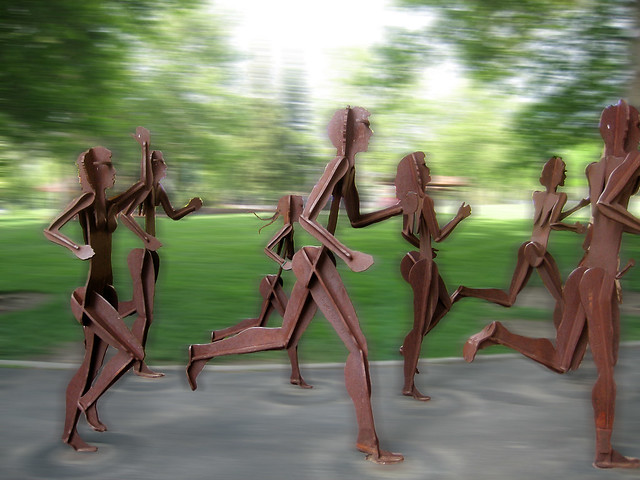I love running; I’m a runner. On weekends, early in the morning, and even during my ever-decreasing lunch breaks, I run. I feel like it gives me the clairvoyance needed to tackle whatever problems I’m having in my life at the moment. As an example, right now I mostly focus on how to solve programming problems by putting them on the back-burner of my mind while my feet hit the pavement repeatedly. It’s therapeutic! It’s also a huge benefit to your body, but I don’t have to tell you that, right? There are a few problems that I have to consider when running, though. Long distance running can be a mind game in which winning means enjoying your run and losing means experiencing pure agony for each centimeter traveled. This post is about handling that mind game.
Let me start by saying that long distance running is completely relative to each person and their experience. I’m sure “long run” to Alberto Salazaar means 20+ miles in a single stretch. It can be relative on other things, too - 5 mile runs seem much longer when you are running in 90 degree, 80% humidity weather, don’t they! For purposes of this post my “long” runs are those of 5 miles or longer only because that seems to be a sweet spot.
So here’s the thing: when I’m running long distances, I tend to psych myself out when I think too much about how my body is performing. I get into an endless loop of assessment similar to the following:
- How is my breathing - is it too rapid, too conversational?
- How is the "chaffage" situation - are my armpits, legs, etc uncomfortable?
- Am I getting enough water, carbs?
- How am I doing on my target pace?
-
Establish a mantra
- This is how I'm supposed to feel
- <insert some lyrics of a song I've been listening to here>
- Calm, cool, collected, confident
- X (substitute X with whatever mile/km you are currently on)
2. Break up the run into chunks
I break down my long runs into manageable chunks, and I only focusing on one chunk at a time. In the middle of my 10 mile run, I think about the plethora of other 5 mile runs I've completed with no problem. I will myself to forget the miles that are increasingly behind me - what's left is what matters, and what's left is shrinking with each step! I find that I break down my runs into roughly half-mile increments. That's probably a byproduct of my watch's capacity to store lap information, but you can use whatever works for you.3. Positive thinking, visualization
I know, it sounds lame. But if it is good enough for Michael Jordan, why shouldn't it be good enough for me? I envision my run before and during my actual run. This helps me anticipate how I am going to physically feel as I take step after step. Knowing what to expect mid-race makes me feel more in control, thus boosting my confidence. What I do is think mostly about how my body is going to handle the most difficult portions of a given route - that big up/downhill, the slippery rock or dirt section, etc. - then I play that section in my head over and over. With repetition comes boredom, so when I actually encounter the obstacle I've been thinking about it doesn't seem so bad.4. Use Jeff Galloway's "dirty tricks"
I have a book called "Marathon: You Can Do It!" by Jeff Galloway, the running guru. In it he provides a couple of mind techniques to use that he calls "dirty tricks." All of them are more or less distraction techniques, but I want to bear mention of them here. I've tried each with success, although with a slight bit of embarrassment. The good thing is that no one has to know - it's all in your head!:- Pretend that you and the person in front of you are lashed together with a giant rubber band. Envision the tension of that rubber band is propelling your body forward and past your opponent.
- In an effort to decrease the influence of the right brain when running (which seems to be the dominant half when doing so, for some reason), do math or other analytical (non-logic) problems that help engage your left brain. The idea is to shift the balance between your left and right brains to keep your mind fresh.
- Imagine a giant hand is guiding you through the difficult parts of the race, gently pushing you so as to relieve part of your strain.
- Glide vs. Stride - switch up your stride every once in a while. Go from short, choppy strides to long ones where your feet barely clear the ground. Note: this one isn't just a mental trick. The physical changes help your muscles go longer.
